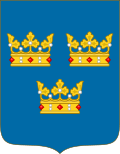Taxation in Sweden
Taxation in Sweden on salaries for an employee involves contributing to three different levels of government: the municipality, the county council, and the central government. Social security contributions are paid to finance the social security system.
Income tax on salaries is deducted by the employer (a PAYE system) and paid directly by the employer to the Swedish Tax Agency (Skatteverket).
The effective taxation rate in Sweden is commonly cited as among the highest in the world, see List of countries by tax rates.
.png)
Sweden has a taxation system for income from work that combines an income tax (paid by the employee) with social security contributions (employers contributions) that are paid by the employer. The total salary cost for the employer is thereby the gross salary plus the social security contributions. The employer makes monthly preliminary deductions (PAYE) for income tax and also pays the social security contributions to the Swedish Tax Agency.
The income tax is contingent on the person being taxable in Sweden, and the social security contributions are contingent on the person being part of the Swedish social insurance plan. The income tax is finalised through a yearly tax assessment the year following the income year.[1]
Social security contributions
The specifics of the social security contributions (employer's contributions, also called payroll tax in English) may be found at the Swedish Tax Agency's Website.[2]
Example of salary taxation through PAYE
Assumptions: income tax (direct, 32%), employer social fee (indirect, 31.42%)
From a pay of 100, the employee first pays 32 in income tax (direct, 32%); on top of that, the employer pays an additional 31.42 in employer's social fees (indirect, 31.42%).
Thus, from a pay check of 100, 63.42/131.42 (i.e., 48.3%) is paid as taxes, although the employer's contribution is a fee for the employee's adherence to the Swedish social security scheme. The effective rate may be lowered by, for example, earned income tax credits and private retirement savings contributions.
In addition, the employee pays 7 percent in pension contributions to the public system, with a cap at an annual income of 420,447 kr. Thus, the maximum employee contribution is 29,400 kr. The employee's contributions are fully tax-deductible.
Value added tax
The value added tax (mervärdesskatt or moms) rate in Sweden is 25%, with exceptions for food and services like hotel room rental fees (12%), and for sales of publications, admission tickets to cultural events and travel within Sweden (6%).[3]
Income tax
Sweden has a progressive income tax, the rates for 2014 are as follows:
- 0% from 0 kr to 18,800 kr (~0 – 2,690 USD)
- Circa 31% (ca. 7% county and 24% municipality tax): from 18,800 kr to 433,900 kr (~2,690 – 62,140 USD)
- 31% + 20%: from 433,900 kr to 615,700 kr (~62,140 – 88,180 USD)
- 31% + 25%: above 615,700 kr (88,180 USD and up)[4]
Capital Gains
Sweden has a flat tax rate of 30% for capital gains.[5]
Registering a non-Swedish company or sole trader in Sweden
A foreign company conducting business in Sweden, whether a natural or a legal person, may become taxable for VAT, employer´s contributions and/or income tax. The company should then apply for registration at the Swedish Tax Agency, and may apply for a Swedish F-tax certificate.
In the ‘Tax application for foreign entrepreneurs´ brochure and form, SKV 419 and SKV 4632 respectively, there is information on how to submit the application.
Sole traders who have a Swedish personal number, and corporations that have a representative who has a Swedish personal number and who is also authorised to sign (authorised to sign by himself) on behalf of the company, may submit the application electronically through the verksamt.se website. Verksamt.se is jointly managed by the Swedish Tax Agency, the Swedish Companies Registration Office and the Swedish Agency for Economic and Regional Growth. Other foreign companies may submit their application directly to the International Tax Offices[6] at the Swedish Tax Agency by post. When registered with the Swedish Tax Agency, the foreign company receives a unique Swedish identity number. For natural persons to receive such a number they must verify their identity with a passport or another such identity card or documentation. For a legal person it is required that the identity is verified with some form of attested certificate of registration/incorporation and that the representative demonstrates his/her authority to represent (sign) on behalf of the legal person when it requests registration for taxation. Foreign legal persons active in Sweden should first contact the Swedish Companies Registration Office to ask if they are required to register a branch office. If such a registration is made with the Swedish Companies Registration Office, they will supplied with a Swedish registration number by the Swedish Tax Agency. For contact information, see the Swedish Companies Registrations Office website.
Further information in English can be found on the Swedish Tax Agency's website.[7]
Note that buying a Swedish company or Swedish real-estate does not necessarily give right of residence in Sweden. Fraudulents in e.g. Egypt have sold such assets claiming they would give right of residence.[8]
See also
References
- ↑ "För arbetsgivare". www.skatteverket.se (in Swedish). Swedish Tax Agency.
- ↑ "Arbetsgivaravgifter". www.skatteverket.se (in Swedish). Swedish Tax Agency.
- ↑ "Momsbroschyren (SKV 552)". www.skatteverket.se (in Swedish). Swedish Tax Agency.
- ↑ "Skatteverket, om statlig inkomstskatt". www.skatteverket.se (in Swedish). Swedish Tax Agency.
- ↑
- ↑ "Utlandsskattekontor i Malmö och Stockholm" [International Tax Offices in Malmö and Stockholm]. www.skatteverket.se (in Swedish). Swedish Tax Agency.
- ↑ 'Skatteverket.se: Tax registration of foreign companies, Swedish Tax Agency
- ↑ Henke, Jesper (13 June 2013). "Tomtköp skulle ge uppehållstillstånd" (in Swedish). Sveriges Television.
Further reading
- Swedish Tax Agency (2011). Taxes in Sweden 2010. An English Summary of Tax Statistical Yearbook of Sweden (PDF). Swedish Tax Agency.
- Swedish Tax Agency 2011. Tax registration of foreign companies in Sweden, Swedish Tax Agency's website

